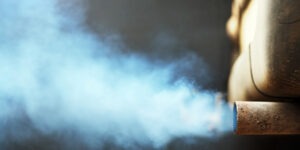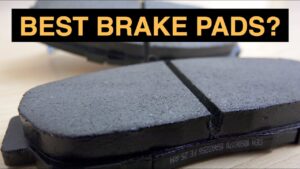Unless you have an electric or hydrogen cell-powered car, there will be no blue smoke from the exhaust when accelerating. Nevertheless, the most auto enthusiast is fond of petrol or diesel engine with preferably manual transmission. One such important thing for these crude derivative engines, exhaust gas, is like blood pressure for car engines.

There is nothing serious going in your engine until it gets serious. It can be categorized as a minor problem and a major problem. In this article, we are here to help you to eliminate the problem.
Table of Contents
Do You See Blue Smoke From The Exhaust When Accelerating?
All the exhaust gasses created in the hot engine need to be expelled quickly, and the exhaust system allows them out in a safe and controlled manner. Well, the smoke color is the indication of good combustion life for the engine. Different smoke color from the exhaust is a sign of various problems acting in the machine.
There are three different smoke colors observed from an engine: white, black, and blue colors. Blue smoke exits from the exhaust in various color shades, where blue is considered the primary smoke color here, causing the blue smoke from the car exhaust when accelerating.
The blue smoke is caused due to the burning of oil in the combustion chamber, where it accidentally got in contact, or any leak caused inside the engine casing. If the blue smoke occurs in a car for high mileage, it might mean that the valve seals or piston rings are worn, allowing oil to enter the fuel system around the cylinders or valves.
How Does Oil Get In Combustion Chamber?
Oil is a lubricating substance provided to decrease the friction and transfer of heat between parts. Initially, Engine oil is designed to lubricate moving parts, and it doesn’t enter the fuel system if a car is running correctly. As time passes on, regular wear of the engine cylinder and piston rings and walls causes the majority of this problem. The leak happens when the piston rings are worn out, and oil leaks to the combustion chamber, where it is burned together with fuel. Depending on the thickness of the oil, the smoke will be bluish.

Blue Smoke Caused By Minor Problem:
Here we will discuss the minor problems with the puff of blue smoke from the exhaust when accelerating.
- All engines will burn a small quantity of oil. A thin screen of oil lubricates the cylinders and surfaces, which also burnt during combustion. This can occur in brand-new cars or performance cars.
- A spill of oil to exhaust during oil top-up can be a possible problem for blue smoke.
- Excess filling of oil during servicing will penetrate oil into the combustion chamber due to rapid movement and splashing of oil beneath the piston rods inside the cylinder.
Blue Smoke Caused By Major Problem:
Four major problems are causing blue smoke.
1. Struck PCV Valve:
If you observe blue smoke appearing in your car all the time, then you have to look at PCV (Positive Crank Ventilation). The function of the PCV valve is to release the pressure build-up in the oil pan into the engine’s manifold. The intake manifold is connected to the air filter of the engine. If the PCV valve gets stuck, it will keep mixing the oil with other gases inside the engine. Combustion with this will cause blue smoke.
2. Worn Engine:
A worn engine is another culprit responsible for creating blue smoke from on startup. All pistons have metal slip rings around their side like bracelets. The function of these slip rings is to provide airtight sealing for the cylinder. So if these piston slip rings are worn out, there is a potential case of oil leaks into the combustion chamber.

3. Blown Turbo:
For a turbocharged car, the blue smoke is a sign that the blower requires replacement. Burning oil can cause a rough start since it ruins the car’s spark plugs. Blue smoke will suddenly appear in your car exhaust line if your car blows a turbo.
It is caused due to either a broken turbo casing or a broken oil seal in the turbo.
4. Fluid Loss In Transmission:
A modulator is a device used to control the transmission shift in older vehicles with vacuum-controlled automatic transmission if any potential problem with this modulator causes the sucking of transmission fluid into the engine like a failed diaphragm.
How To Get Rid Of Blue Smoke?
We will brief you on getting rid of blue smoke from the exhaust when accelerating.
- If the blue smoke stops after a few minutes, then no problem. Another reason could be that some oil has spilled into the exhaust while being topped up and burnt off by the hot exhaust while you’re driving.
- The good thing is that it’s not a big or expensive job, but the bad news is that it might become costly if the cylinder wall is worn out. As with any repair, the sooner you have it diagnosed and fixed, the less expensive it would be.
- Replacing the piston’s slip rings is an expensive job as it means removing the engine parts apart for replacement.
- If there is a fault in the turbocharger, you may have to repair them or replace them.
- A modulator break will take you seriously and is expensive, similar to a worn engine cylinder, and a complicated procedure. The more the oil in the engine, the more you see the blue smoke.
Tips To Maintain Your Car Engine:
Here are some maintenance tips that you have already forgotten to perform.
- Change the oil in regular intervals.
- Maintain the fluid levels.
- Check for breaks are good.
- Don’t dry your engine.
- Never ignore the engine lights.
- Check the serpentine belt.
- Maintain good battery life.
- Never rash drive.
- Don’t overload the engine.
What Causes Blue Smoke During Speed Increase?
What Does Blue Smoke Mean When Accelerating? Utilizing blue/dark fumes smoke intends that there is probably an oil spill inside your motor, which prompts oil consumption. Conceivable spilling valve seals harmed Piston Rings, or worn chamber dividers are the reason for the break.
How Would You Fix Blue Smoke From Exhaust?
Instructions to Fix Blue Smoke from Exhaust
Eliminate Excess Oil. The easiest fix is to eliminate some oil from the framework. …
Clean Engine. If the motor hasn’t been cleaned in some time, now is the ideal time to investigate it. …
Supplant Piston Rings. …
Fix Turbocharger. …
Supplant PCV Valve. …
Fix Valve Seals.
For What Reason Is My Exhaust Blowing Blue Smoke?
Blue Exhaust Smoke
Assuming that you are seeing blue smoke from the fumes, it implies your motor is consuming oil because of an oil spill. This side effect could be the consequence of a spilling valve seal or an issue with a cylinder ring.
For What Reason Does My Vehicle Smoke When I Speed Up Hard?
Smoke frequently leaves motors because of overheating. This can be brought about by flawed wire housings, warmed deposits on the motor square, and overheated fluids including oil, transmission liquid, and brake liquid. There may likewise be an issue in your coolant framework, or your motor might not have sufficient oil.
Conclusion:
Your neighbor may ask, “Hey! Do you see the blue mess that you created?” which is a bad situation? It is also not good for the environment, which creates double the depletion gas than the usual rate. You may also be charged for driving with such an issue. It’s better to take your vehicle to a professional mechanic or auto shop so that they will make it perfectly alright.
If you find this helpful article, please let us know and follow us for similar content. If you have any queries, please let us know in the comment section below. Also, share your thoughts and suggestions in the comment box.



